Guest Post - Getting Started with Comic Books
Post by Victoria B of Randomnerdery.com
Guest Post - Getting Started with Comic Books
One from the archives of the old blog, here! My husband Barry offered to put together a comic-based guest post, because at the time I was complaining that comics were hard to get into and I didn't know where to start. I have no idea how he fits so much information into his brain, but his wide-ranging interests make him really well placed for recommendations, some of which you'll find in the article. He's made some updates since it was originally published, and has been through to make sure he hasn't changed his mind about anything!
If you want to know more about comics or are just looking for something different to read, I hope you find something new and useful below.
Guest Post: Where to Start with Comics
As a long time comics fan, I’m often asked 'how do I get into comics?' like it’s the Masons or the Bilderberg group - a question that is unheard of for any other medium. You don’t hear people ask how to watch TV or 'those books you read, what would be the best way to get into them?' because the consumer selects their entry point based upon their own genre preferences.
Partly this disconnect is because people only see the spandex-clad superhero genre when they think of comics, failing to see the less publicised non-superhero comics. Mainstream cinema has helped to cement this idea by promoting superhero movies as ‘comic book’ movies whilst other movies adapted from comics, like Ghost World or Surrogates, are considered merely other entries in their respective genres.
Too often we confuse the superhero genre with the medium of comics, preventing widespread acceptability and constricting the readership. In order for you to 'get into’ comics, you first need to jettison the idea that comics are a genre and start thinking of them as a medium.
Problem (with) number one
From their conception comics have been numbered to indicate order, rather than dated as we would a magazine. This means that people can be put off of picking up a comic as it shows its history on the cover.
In comics we have created a bit of a monster as, frankly, the numbers are mostly meaningless. They have been adulterated by publishers over the years, yet they are published to appease the fanboys whilst also driving off new readers. For example, Detective Comics is currently around the issue 45 mark, yet this is a comic that has been running since 1937 and has around 900 issues in the series.
The numbering issue is something that has not troubled me for years, having repeatedly seen series re-numbered (for publisher to get the ‘bump’ in sales a new issue one garners) and then return to their original numbering, usually in accordance with an ‘event’ number (normally a multiple of 25, 50 or 100). I appreciate that I am potentially in the minority here, but frankly there are far greater things to worry about than the number on the front of your comic.
Before you start with a series, figure out whether you need to start from the beginning of the whole series or from the beginning of a story. For example, if I were to start reading X-Men today, I would start from the beginning of the latest story rather than from X-Men issue one. There is no need for me to know the complete history of the X-Men to get enjoyment out of the story. If I like the story there is no reason why I couldn’t go back to read earlier stories.
However, if I were to start on a finite story (more like a modern series such as Breaking Bad rather than a soap opera style ‘on-going’ story) I would start from the first issue, as knowing the whole narrative is the point of shorter stories such as these.
Generally speaking, if there are less than 100 issues of a story I would get it from the beginning. Above that I would start from the latest story. A rule of thumb, but it should serve you proud.
Don’t be afraid to start any story from any issue - if it is good storytelling, you’ll be able to pick it up. Besides, we are well accustomed to coming into stories mid-point from watching already started movies on TV, to watching long running TV dramas and multi-movie franchises (I’m willing to bet your first Bond film was not Dr No, yet you got the gist, right?)
To argue that you have to start from the beginning is selling yourself short - you’re smarter than that.
Where to start?
My advice is always:
Point one is fairly self explanatory - if you like crime books or films, you’ll probably like crime comics.
Point two is also fairly simple - comics are a visual medium; you need to like the look of the art to buy into the story. We already do this for other media as we pick films we ‘like the look of’ and books that fit a narrative style we enjoy (I personally like a first person narrative, yet I know others who will not read one). Pick something that looks cool and you will buy into it more - sometimes it will even help you enjoy a story with shoddy writing.
Other people aren't you
Recommendations are a good place to start, but need to be caveated with 'if you enjoy the same stories as this person'. People (including me) will recommend comics to you based on their own preferences and will assume that you will like the same stuff as them, so don’t take their advice as gospel. For example, I have a friend that will recommend the ‘Death of Superman’ story to all who ask, yet I would rather cut out my own eyes than read that garbage again.
Do a bit of homework before blindly following the advice of others and you will be golden. The same is true for online and Amazon reviews, which are just as biased and usually written by people with far too much time on their hands. The same is true for blogs...
Recommendations: Genre by Genre
Below, I’m going to recommend some comics based upon common genres (they’re pretty broad and I may do more specific ones another day) and will try to link them to films, books and TV that share a similar style.
I’m going to ignore superheroes completely as a genre, as I think they will probably fill a post on their own.
The Parker series (The Hunter, The Outfit, The Score, Slayground) by Darwyn Cooke
I’ve started with these books because they are the finest examples of comics as a storytelling medium currently being published, demonstrating the nuance and subtlety of a master of any medium.
Given that the main character (Parker) is a professional thief with dubious morals, there is the potential for him to come across as a combination of a robot and a sociopath if handled incorrectly. Cooke walks the tightrope of keeping Parker likeable whilst also maintaining his edge, thereby keeping the reader guessing as to who survives the story whilst also caring that Parker himself makes it out alive.
This is helped as the original source material Cooke is adapting is of such high quality as to be regarded by many as the watermark for quality crime novels (Parker is the star of a series of books that have not only withstood the test of time, but been consistently magnificent for decades).
Cooke’s art style demonstrates that less is definitely more, with an economy of lines that could make the art seem simplistic if not done by such a gifted individual.
Somehow this book manages to both feel current and from the sixties at the same time, making you wonder if Parker was a comic character before he was a literary hero.
I have partly recommended this series as it is released in self-contained books (or graphic novels if you want to be pretentious about it) and they are in no real order so can be read in any order you feel like. If you like heists and sixties style, this is the book for you.
Criminal by Ed Brubaker and Sean Phillips
This is a series of individual stories that at first glance have little in common, beyond the overall theme of criminality. Over time they start to bleed together, showing the reader a unified ‘world’ in which the characters live, but without forcing the reader to remember every last detail about previous stories in order to enjoy the current one.
Brubaker is a major crime fiction aficionado who wears his influences on his sleeve, yet his work never feels like it is aping another’s style.
Phillips seems born to draw tales of dive bars and back alleys, as his art flows from the shadows making each panel seem as dirty and grimy as the characters it depicts.
This book can be bought in oversized hardcover omnibus editions that really show the art off to its full potential and offer the reader more bang for their buck as they contain more story than their smaller traditional sized brethren. I would start with the edition called ‘Coward’ as this is the beginning of the series and also one of the better storylines. If you enjoy films like Heat, Ronin or Oceans Eleven, you’ll get a kick out of these stories.
Hellblazer by various (Try ‘Haunted’ by Warren Ellis)
Sadly this long running series, progenitor for all modern ‘urban fantasy’, was cancelled by DC and re-launched as the more kid friendly ‘Constantine’ (don’t bother).
It revolves around scouse magician John Constantine (played by Keanu Reeves in the movie adaptation...) and those unfortunate enough to share his life. It eschews the flashy magic of most urban fantasy, instead focussing on creating layered characters that make the reader care and drive the storylines without the need for a ‘monster of the week’. The closest example I could think of would be if Ken Loach directed a film in a Lovecraftian world or maybe a supernatural version of Luther.
The drama and horror is drawn from the evils that humans inflict upon one another, thereby making the monsters and demons seem tame in comparison (the ‘real’ meaning of a scarlet woman is the epitome of true evil). It is even implied that magic itself is a form of con-job that has no power and that Constantine is little more than a con-man with the power to see evil.
This is a comic where the main character is effected, both mentally and physically, by the world he lives more than any other (he dies, others die and worse) and serves to make this is a truly compelling (if difficult to stomach) world to visit. This is essentially the book that Jim Butcher wishes the Dresden Files were (and so do I).
Twisted Dark by Neil Gibson
A series that really follows its own title, Twisted Dark offers both twisted and dark storytelling. The series of short, nasty horror stories that make up this world are perfect for people that have a short time to read (as a parent, this is now me) yet still want a seriously good story. This is short fiction in comic form, which is not something I usually engage with (I'd rather read a collection of Judge Dredd than the weekly 2000AD). The art varies between stories (in style as well as quality), but each artist matches the story perfectly. The main draw are the stories themselves and writer Neil Gibson has reached the status that I'll read anything he writes. I recommend this to anyone who'll listen and if this article achieves nothing else, go and buy the first book in the series.
Strangers in Paradise by Terry Moore
The smart money would have been on Scott Pilgrim for this slot, what with it being a movie already and all, but I have to recommend Strangers in Paradise instead as it holds a place close to my heart.
Essentially this book surrounds the relationship of childhood friends Francine and Katchoo and is a romantic comedy about the enduring love a true friendship can bring. It also involves international assassins. Yes, assassins.
That a book can exist where international assassins can sit cheek by jowl with kitchen sink drama and not feel out of place shows the skill of Moore’s writing. His characters are also fully formed, with facial expressions that leave you in no doubt as to what they are thinking and bond you to them like no other book. There was a story arc in this that made me weep like a baby - it’s that good. It is a slow burn though, so be prepared to give it a couple of books to grow on you. If you like Richard Curtis comedies then this will be a book you’ll enjoy.
Liberty Meadows by Frank Cho
Originally a newspaper strip, this channels the comedy gold of the final panel reveal mastered by Garfield and Peanuts.
Centred around the titular animal sanctuary, Liberty Meadows follows the adventures of the humans running the sanctuary and their anthropomorphised ‘clients’ that live within it. Combining a Loony Tunes sense of fun with a keen sense of (unrequited) romance and a duck that may be the cutest animal ever drawn has proven to be a winner, drawing me back time and again and leaving me in stitches every time.
Despite its comedy trappings Liberty Meadows also manages to cram in serious stories, giving the series an addictive quality that other strips don’t have.
Cho’s art style is also sublime, mixing traditional cartooning with cheesecake pinup art means that each character has their own personality and also acts as a visual cue to the reader as what to expect genre and story-wise from the characters.
King City by Brandon Graham
The big brother to ‘Adventure Time’, King City is the tale of Joe, a catmaster and burglar who owns a cat that with a shot of ‘cat juice’ can do anything. I mean anything.
King City is not so much a story as a world in which we see one story and as a result I would compare it most to Lord of the Rings. This is nothing to do with the style or story content, but more that the story is a conduit for the writer (writer/artist in Graham's case) to explore and expand a world. King City has far more puns than LotR though.
Graham’s art style demonstrates this focus, showing far more of the city than the story needs, but giving the reader a sense of the wider world beyond the boundaries of the narrative. His graffiti-like style fits the urban sprawl of the story and the imagination on display on every panel is worthy of awe.
If you like world building sci-fi like Bladerunner or the current era of Doctor Who, then this will tickle your fancy.
Transmetropolitan by Warren Ellis and Darick Robertson
Essentially the tale of a reluctant future journalist dragged out of retirement to cover one last election, this is one of the best comic series I have ever read. The use of science fiction to cover political subject matter is as old as the hills, but is as well executed here as it was by Dick or Orwell.
The story centres around the election (to begin with) between the incumbent president named ‘the beast’ and the newcomer called ‘the smiler’. The story is a meditation on the mid 90’s movement from old school ‘left-right’ politics to a more centrist and populist politics practised by Blair and Clinton. Whilst some of the appeal of the story comes from its relevance to my own political awakening, it also manages to be a kick-arse sci-fi story to boot, with a main character that owes a little to Doctor Who (except he has a bowel disruptor instead of a sonic screwdriver), a little to Hunter S Thompson and a lot to the writer for his characterisation.
This is a story with a two headed cat, weaponised pollen, post-humanism and filthy assistants to distract from the political undercurrents and actually touching main story. Patrick Stewart likes this comic so much that he wanted to play the main character in a film version. What do you have to lose?
Bone by Jeff Smith
One day Pixar will announce that they are making a film of this comic and I will implode with joy. Perfectly mixing the traditional childrens storytelling tropes with elements of fairy tales and classic Disney, this is tale of the Bone family and their adventures in the woods.
Mixing anthropomorphised cartoon characters with realistic looking (ish) human characters, genuinely creepy villains, an epic story of heroism and a potentially unhealthy love of Moby Dick to create a child’s epic fantasy that makes the Hobbit look a bit dull.
Whilst the story is suitable for children, it is unfair to label it as just a children’s comic as like a Pixar film, there are hidden depths to entertain the adults too, be it the romance between Fone Bone and Thorn, the avaricious schemes of Phoney Bone or the failed ambushes of the rat creatures.
Bone has been likened to Lord of the Rings by critics, but I would liken it to modern masterpieces by Pixar, like Wall-E or Up, that manage to speak across all generations and touch everyone regardless of their age. I'm more excited to read this with my son than I am any other children's book (and that includes Harry Potter); I keep urging him to grow up so we can get started.
If you want to know more about comics or are just looking for something different to read, I hope you find something new and useful below.
Guest Post: Where to Start with Comics
As a long time comics fan, I’m often asked 'how do I get into comics?' like it’s the Masons or the Bilderberg group - a question that is unheard of for any other medium. You don’t hear people ask how to watch TV or 'those books you read, what would be the best way to get into them?' because the consumer selects their entry point based upon their own genre preferences.
Partly this disconnect is because people only see the spandex-clad superhero genre when they think of comics, failing to see the less publicised non-superhero comics. Mainstream cinema has helped to cement this idea by promoting superhero movies as ‘comic book’ movies whilst other movies adapted from comics, like Ghost World or Surrogates, are considered merely other entries in their respective genres.
Too often we confuse the superhero genre with the medium of comics, preventing widespread acceptability and constricting the readership. In order for you to 'get into’ comics, you first need to jettison the idea that comics are a genre and start thinking of them as a medium.
Problem (with) number one
From their conception comics have been numbered to indicate order, rather than dated as we would a magazine. This means that people can be put off of picking up a comic as it shows its history on the cover.
In comics we have created a bit of a monster as, frankly, the numbers are mostly meaningless. They have been adulterated by publishers over the years, yet they are published to appease the fanboys whilst also driving off new readers. For example, Detective Comics is currently around the issue 45 mark, yet this is a comic that has been running since 1937 and has around 900 issues in the series.
The numbering issue is something that has not troubled me for years, having repeatedly seen series re-numbered (for publisher to get the ‘bump’ in sales a new issue one garners) and then return to their original numbering, usually in accordance with an ‘event’ number (normally a multiple of 25, 50 or 100). I appreciate that I am potentially in the minority here, but frankly there are far greater things to worry about than the number on the front of your comic.
Before you start with a series, figure out whether you need to start from the beginning of the whole series or from the beginning of a story. For example, if I were to start reading X-Men today, I would start from the beginning of the latest story rather than from X-Men issue one. There is no need for me to know the complete history of the X-Men to get enjoyment out of the story. If I like the story there is no reason why I couldn’t go back to read earlier stories.
However, if I were to start on a finite story (more like a modern series such as Breaking Bad rather than a soap opera style ‘on-going’ story) I would start from the first issue, as knowing the whole narrative is the point of shorter stories such as these.
Generally speaking, if there are less than 100 issues of a story I would get it from the beginning. Above that I would start from the latest story. A rule of thumb, but it should serve you proud.
Don’t be afraid to start any story from any issue - if it is good storytelling, you’ll be able to pick it up. Besides, we are well accustomed to coming into stories mid-point from watching already started movies on TV, to watching long running TV dramas and multi-movie franchises (I’m willing to bet your first Bond film was not Dr No, yet you got the gist, right?)
To argue that you have to start from the beginning is selling yourself short - you’re smarter than that.
Where to start?
My advice is always:
- Pick a genre you like in other media
- Pick an artist you like the look of
Point one is fairly self explanatory - if you like crime books or films, you’ll probably like crime comics.
Point two is also fairly simple - comics are a visual medium; you need to like the look of the art to buy into the story. We already do this for other media as we pick films we ‘like the look of’ and books that fit a narrative style we enjoy (I personally like a first person narrative, yet I know others who will not read one). Pick something that looks cool and you will buy into it more - sometimes it will even help you enjoy a story with shoddy writing.
Other people aren't you
Recommendations are a good place to start, but need to be caveated with 'if you enjoy the same stories as this person'. People (including me) will recommend comics to you based on their own preferences and will assume that you will like the same stuff as them, so don’t take their advice as gospel. For example, I have a friend that will recommend the ‘Death of Superman’ story to all who ask, yet I would rather cut out my own eyes than read that garbage again.
Do a bit of homework before blindly following the advice of others and you will be golden. The same is true for online and Amazon reviews, which are just as biased and usually written by people with far too much time on their hands. The same is true for blogs...
Recommendations: Genre by Genre
Below, I’m going to recommend some comics based upon common genres (they’re pretty broad and I may do more specific ones another day) and will try to link them to films, books and TV that share a similar style.
I’m going to ignore superheroes completely as a genre, as I think they will probably fill a post on their own.
Crime
The Parker series (The Hunter, The Outfit, The Score, Slayground) by Darwyn Cooke
I’ve started with these books because they are the finest examples of comics as a storytelling medium currently being published, demonstrating the nuance and subtlety of a master of any medium.
Given that the main character (Parker) is a professional thief with dubious morals, there is the potential for him to come across as a combination of a robot and a sociopath if handled incorrectly. Cooke walks the tightrope of keeping Parker likeable whilst also maintaining his edge, thereby keeping the reader guessing as to who survives the story whilst also caring that Parker himself makes it out alive.
This is helped as the original source material Cooke is adapting is of such high quality as to be regarded by many as the watermark for quality crime novels (Parker is the star of a series of books that have not only withstood the test of time, but been consistently magnificent for decades).
Cooke’s art style demonstrates that less is definitely more, with an economy of lines that could make the art seem simplistic if not done by such a gifted individual.
Somehow this book manages to both feel current and from the sixties at the same time, making you wonder if Parker was a comic character before he was a literary hero.
I have partly recommended this series as it is released in self-contained books (or graphic novels if you want to be pretentious about it) and they are in no real order so can be read in any order you feel like. If you like heists and sixties style, this is the book for you.
Criminal by Ed Brubaker and Sean Phillips
This is a series of individual stories that at first glance have little in common, beyond the overall theme of criminality. Over time they start to bleed together, showing the reader a unified ‘world’ in which the characters live, but without forcing the reader to remember every last detail about previous stories in order to enjoy the current one.
Brubaker is a major crime fiction aficionado who wears his influences on his sleeve, yet his work never feels like it is aping another’s style.
Phillips seems born to draw tales of dive bars and back alleys, as his art flows from the shadows making each panel seem as dirty and grimy as the characters it depicts.
This book can be bought in oversized hardcover omnibus editions that really show the art off to its full potential and offer the reader more bang for their buck as they contain more story than their smaller traditional sized brethren. I would start with the edition called ‘Coward’ as this is the beginning of the series and also one of the better storylines. If you enjoy films like Heat, Ronin or Oceans Eleven, you’ll get a kick out of these stories.
Horror
Hellblazer by various (Try ‘Haunted’ by Warren Ellis)
Sadly this long running series, progenitor for all modern ‘urban fantasy’, was cancelled by DC and re-launched as the more kid friendly ‘Constantine’ (don’t bother).
It revolves around scouse magician John Constantine (played by Keanu Reeves in the movie adaptation...) and those unfortunate enough to share his life. It eschews the flashy magic of most urban fantasy, instead focussing on creating layered characters that make the reader care and drive the storylines without the need for a ‘monster of the week’. The closest example I could think of would be if Ken Loach directed a film in a Lovecraftian world or maybe a supernatural version of Luther.
The drama and horror is drawn from the evils that humans inflict upon one another, thereby making the monsters and demons seem tame in comparison (the ‘real’ meaning of a scarlet woman is the epitome of true evil). It is even implied that magic itself is a form of con-job that has no power and that Constantine is little more than a con-man with the power to see evil.
This is a comic where the main character is effected, both mentally and physically, by the world he lives more than any other (he dies, others die and worse) and serves to make this is a truly compelling (if difficult to stomach) world to visit. This is essentially the book that Jim Butcher wishes the Dresden Files were (and so do I).
Twisted Dark by Neil Gibson
A series that really follows its own title, Twisted Dark offers both twisted and dark storytelling. The series of short, nasty horror stories that make up this world are perfect for people that have a short time to read (as a parent, this is now me) yet still want a seriously good story. This is short fiction in comic form, which is not something I usually engage with (I'd rather read a collection of Judge Dredd than the weekly 2000AD). The art varies between stories (in style as well as quality), but each artist matches the story perfectly. The main draw are the stories themselves and writer Neil Gibson has reached the status that I'll read anything he writes. I recommend this to anyone who'll listen and if this article achieves nothing else, go and buy the first book in the series.
Rom-Com
Strangers in Paradise by Terry Moore
The smart money would have been on Scott Pilgrim for this slot, what with it being a movie already and all, but I have to recommend Strangers in Paradise instead as it holds a place close to my heart.
Essentially this book surrounds the relationship of childhood friends Francine and Katchoo and is a romantic comedy about the enduring love a true friendship can bring. It also involves international assassins. Yes, assassins.
That a book can exist where international assassins can sit cheek by jowl with kitchen sink drama and not feel out of place shows the skill of Moore’s writing. His characters are also fully formed, with facial expressions that leave you in no doubt as to what they are thinking and bond you to them like no other book. There was a story arc in this that made me weep like a baby - it’s that good. It is a slow burn though, so be prepared to give it a couple of books to grow on you. If you like Richard Curtis comedies then this will be a book you’ll enjoy.
Comedy
Liberty Meadows by Frank Cho
Originally a newspaper strip, this channels the comedy gold of the final panel reveal mastered by Garfield and Peanuts.
Centred around the titular animal sanctuary, Liberty Meadows follows the adventures of the humans running the sanctuary and their anthropomorphised ‘clients’ that live within it. Combining a Loony Tunes sense of fun with a keen sense of (unrequited) romance and a duck that may be the cutest animal ever drawn has proven to be a winner, drawing me back time and again and leaving me in stitches every time.
Despite its comedy trappings Liberty Meadows also manages to cram in serious stories, giving the series an addictive quality that other strips don’t have.
Cho’s art style is also sublime, mixing traditional cartooning with cheesecake pinup art means that each character has their own personality and also acts as a visual cue to the reader as what to expect genre and story-wise from the characters.
Science Fiction
King City by Brandon Graham
The big brother to ‘Adventure Time’, King City is the tale of Joe, a catmaster and burglar who owns a cat that with a shot of ‘cat juice’ can do anything. I mean anything.
King City is not so much a story as a world in which we see one story and as a result I would compare it most to Lord of the Rings. This is nothing to do with the style or story content, but more that the story is a conduit for the writer (writer/artist in Graham's case) to explore and expand a world. King City has far more puns than LotR though.
Graham’s art style demonstrates this focus, showing far more of the city than the story needs, but giving the reader a sense of the wider world beyond the boundaries of the narrative. His graffiti-like style fits the urban sprawl of the story and the imagination on display on every panel is worthy of awe.
If you like world building sci-fi like Bladerunner or the current era of Doctor Who, then this will tickle your fancy.
Transmetropolitan by Warren Ellis and Darick Robertson
Essentially the tale of a reluctant future journalist dragged out of retirement to cover one last election, this is one of the best comic series I have ever read. The use of science fiction to cover political subject matter is as old as the hills, but is as well executed here as it was by Dick or Orwell.
The story centres around the election (to begin with) between the incumbent president named ‘the beast’ and the newcomer called ‘the smiler’. The story is a meditation on the mid 90’s movement from old school ‘left-right’ politics to a more centrist and populist politics practised by Blair and Clinton. Whilst some of the appeal of the story comes from its relevance to my own political awakening, it also manages to be a kick-arse sci-fi story to boot, with a main character that owes a little to Doctor Who (except he has a bowel disruptor instead of a sonic screwdriver), a little to Hunter S Thompson and a lot to the writer for his characterisation.
This is a story with a two headed cat, weaponised pollen, post-humanism and filthy assistants to distract from the political undercurrents and actually touching main story. Patrick Stewart likes this comic so much that he wanted to play the main character in a film version. What do you have to lose?
Children's
Bone by Jeff Smith
One day Pixar will announce that they are making a film of this comic and I will implode with joy. Perfectly mixing the traditional childrens storytelling tropes with elements of fairy tales and classic Disney, this is tale of the Bone family and their adventures in the woods.
Mixing anthropomorphised cartoon characters with realistic looking (ish) human characters, genuinely creepy villains, an epic story of heroism and a potentially unhealthy love of Moby Dick to create a child’s epic fantasy that makes the Hobbit look a bit dull.
Whilst the story is suitable for children, it is unfair to label it as just a children’s comic as like a Pixar film, there are hidden depths to entertain the adults too, be it the romance between Fone Bone and Thorn, the avaricious schemes of Phoney Bone or the failed ambushes of the rat creatures.
Bone has been likened to Lord of the Rings by critics, but I would liken it to modern masterpieces by Pixar, like Wall-E or Up, that manage to speak across all generations and touch everyone regardless of their age. I'm more excited to read this with my son than I am any other children's book (and that includes Harry Potter); I keep urging him to grow up so we can get started.





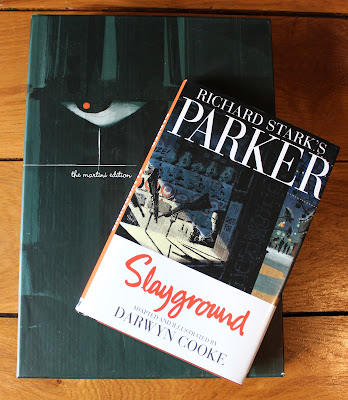
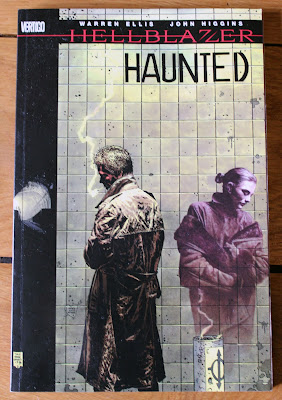
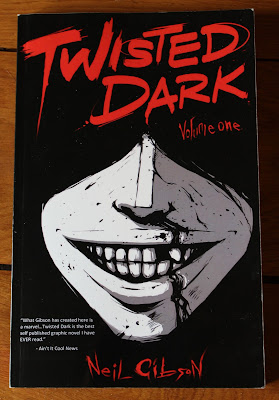
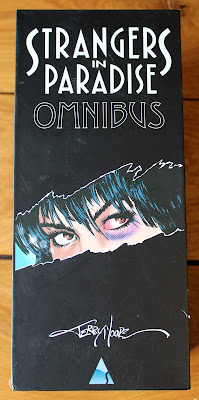
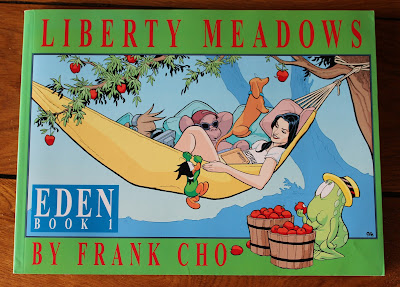

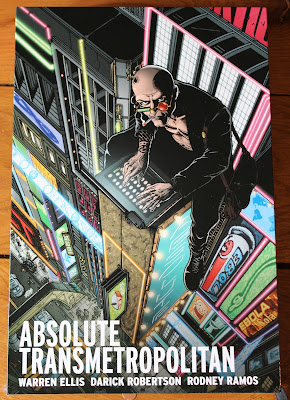
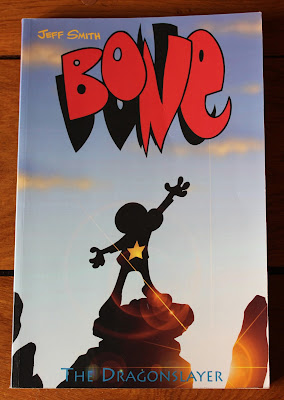





0 comments :